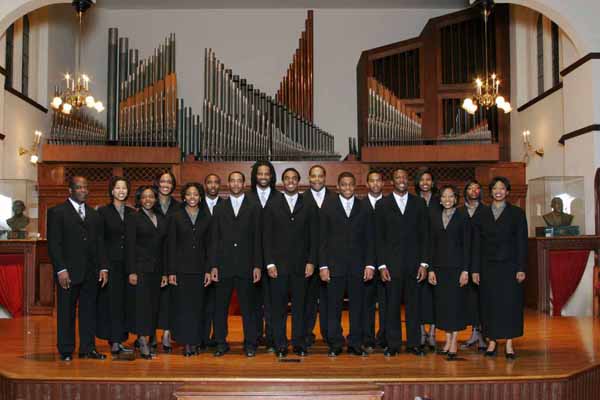In Celebration of the Human Voice - The Essential Musical Instrument
Home | Doo Wop | Barbershop | World | Contemporary | Christian | Vocal Jazz | Choral | Christmas | Instructional | Arrangements
Classical | Opera | Musicals | Personality | Young Singers | Disney | Videos | Songs | The Artists

Fisk Jubilee Singers History

Click Here for Sheet Music and Songbook Vocal Arrangements
On November 16, 1871, a group of unknown singers -- all but two of them former slaves and many of them still in their teens -- arrived at Oberlin College in Ohio to perform before a national convention of influential ministers. After a few standard ballads, the chorus began to sing spirituals -- "Steal Away" and other songs" associated with slavery and the dark past, sacred to our parents," as soprano Ella Sheppard recalled. It was one of the first public performances of the secret music African Americans had sung in fields and behind closed doors. Charged with keeping the financially troubled school afloat, treasurer George Leonard White proposed taking Fisk's most gifted singers on a fundraising tour of the North. Before they even left town, they encountered resistance: the parents were afraid to let their children go; White's fellow teachers opposed the tour; and the American Missionary Association, the northern religious organization that operated Fisk, refused to help, worried that the chorus's appeal for funds would jeopardize their own fundraising activities. But White persevered. "I'm depending on God, not you," he told the AMA, and set off with his singers and the last $40 of the school's treasury. "Not one of us had an overcoat or wrap," remembered Ella Sheppard. "Taking every cent he had, and all he could borrow, Mr. White started with his little band of singers to sing the money out of the hearts and pockets of people." Following the path of the Underground Railway, the group made its debut in Cincinnati. Despite the warm reception, donations totaled less than $50. Night after night, it was the same: crowds loved their singing, but the collection plate yielded barely enough to cover their expenses. Yet no one turned back. "All we wanted," recalled soprano Maggie Porter, "was for Fisk to stand." Life on the road took its toll. White and the singers endured rheumatism, bronchitis, chronic coughs. Their clothes ran to rags. But after the triumphant Oberlin performance, word started to spread. In December, the Jubilee Singers appeared at Henry Ward Beecher's weekly prayer meeting at Brooklyn's Plymouth Church. "Every church wanted the Jubilee Singers from that time on," wrote Maggie Porter. They sang for Mark Twain, President Ulysses S. Grant, congressmen, diplomats. "These singers," said one newspaper, "are doing a great work for humanity." Ella Sheppard wrote, "We sang as if inspired. We not only paid the debts at home, we carried home $20,000 with which was purchased the site of our new school. We returned to Fisk amid great rejoicing." After less than two weeks' rest, the singers were back on the road, touring the Eastern United States. Eventually they would tour Europe to universal acclaim and sing for the royal families of Holland, Germany, and Britain. "They are real Negroes," Queen Victoria wrote in her journal. "They come from America and have been slaves. They sing extremely well together." The group raised what today would be millions of dollars, but they paid a terrible price. Worn down by the relentless schedule, an advance man suffered a nervous breakdown. George White lost his wife to typhoid fever. White himself nearly died of a pulmonary hemorrhage. Contralto Minnie Tate's voice was torn to shreds. Tenor Benjamin Holmes's nagging cough was caused by tuberculosis. They faced discrimination on the road and from the press. The "New York World" called them "trained monkeys" who sang "with a wild darky air" and the "Newark Evening Courier" listed them as if they were items from a slave dealer's catalogue. A grueling tour of Germany -- ninety-eight days, forty-one towns, sixty-eight concerts -- brought with it low morale, frayed nerves, and rivalries among the singers. After almost seven years of touring, the Jubilee Singers returned home. They were honored by Fisk for raising the funds to complete Jubilee Hall and save their school. But their contributions extended far beyond Fisk University. They had introduced the world to the power of spirituals and challenged racial stereotypes on two continents. "In their wake, hotels, railways, steamship lines, and boards of education integrated their facilities. The Jubilees not only introduced the world to the music of black America, they championed the liberties of all Americans," says Andrew Ward, co-writer of the documentary and author of "Dark Midnight When I Rise: The Story of the Jubilee Singers." More than 125 years later, the Jubilee Singers of Fisk University continue the concert tradition begun by that courageous original chorus of former slaves. Media Articles |
Select a Category |
Want to Sing? - Find a Chorus Near You
List of Choruses by State | List of Choruses by City
